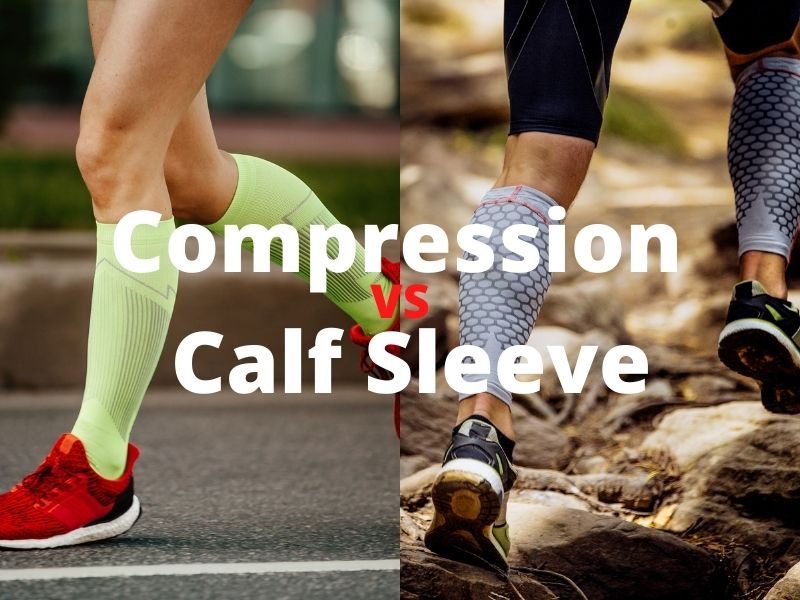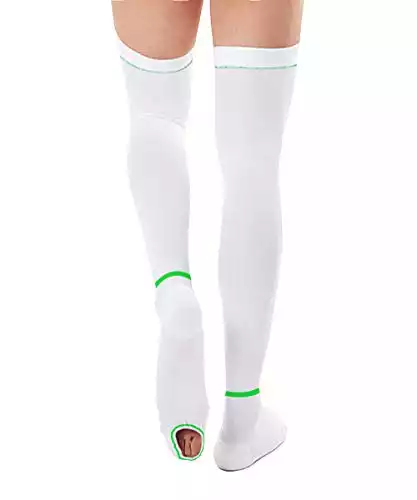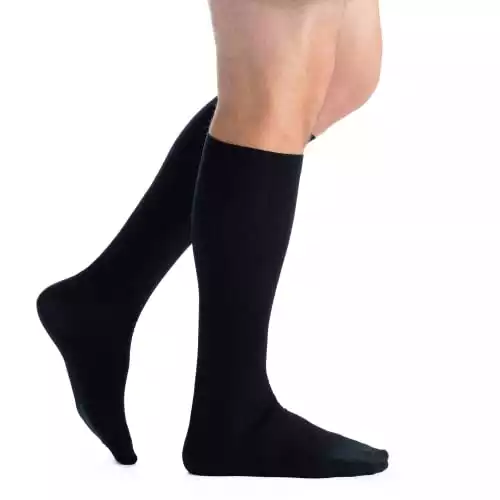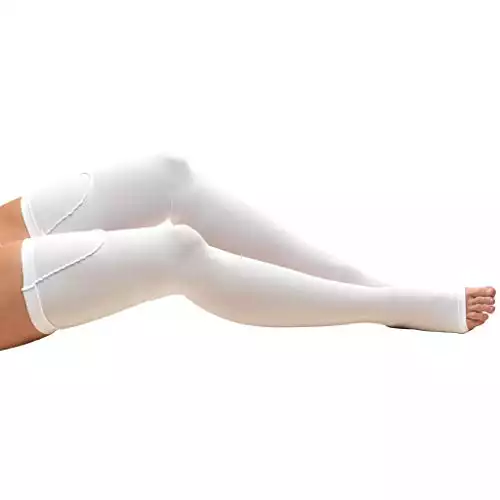Compression socks and calf sleeves are very similar but serve different purposes. It is good to know what those purposes are so that you can get the best product for yourself, be it one or the other.
What’s the difference between compression socks and calf sleeves? Compression socks are used to encourage and increase blood flow in the body. They prevent the blood from pooling in one place. Calf sleeves, however, provide good support during an intense workout. This is to concentrate the blood flow on the muscles that need it most.
Using the wrong kind of support can actually be more harmful than helpful. The wrong one can prevent blood flow where you need it, or collect blood where it shouldn’t go.
They can also be extremely uncomfortable if worn for a long time when they are not needed. It is important to know at least the basics about any compression wear before using it. That way, you do not cause unintended harm to yourself.
How Compression Socks Work
Compression socks are made of a blend of materials, such as nylon and polyester (article). This gives them their compression technology. Compression technology is the way the material applies pressure onto certain areas of the body to improve circulation.
By improving circulation, more oxygenated blood is able to travel through the body. This allows damaged tissue to be able to repair itself.
Compression levels are measured in mm Hg (millimeters of mercury), which correlates to your blood pressure levels. The compression levels range from about 10 mm Hg to about 30 mm Hg, with 10 being a low level of compression and 30 being high.
Your needed level for compression will vary depending on your situation. Athletes might want a lot more compression for longer endurance activities, while an office worker will need lower levels of compression to provide some comfort (article).
Common Uses of Compression Socks

- Comfort: They can reduce swelling and pain in your legs and provide additional support that often just feels nice.
- Sports: They are also used to improve athletic performance, as the socks improve blood flow and lessen soreness. They also help with swelling after an intense workout.
- Preventative: Wearing compression socks lowers your chances of getting deep vein thrombosis (article), a type of blood clot. They can also help prevent injuries from getting worse after surgery. They prevent damages muscles and tissue from tearing.
- Lack of activity: For people who spend a lot of time sitting at an office or traveling in a plane, compression socks improve circulation. A lack of movement in muscles over a long period of time can cause mild atrophy, and compression prevents that.
- Recovery: They can be used to treat and manage many vascular and circulatory diseases.
Graduated Compression
A lot of compression socks market themselves as having graduated compression technology. This means that the pressure of the sock is greater in a certain part of the body and decreases as it moves closer to your heart.
For example, a compression sock would have more pressure applied near the ankles; as it goes up your leg, the pressure decreases.
This allows for the blood to flow better as the compression is working to counteract gravity. It works to pump the blood up your leg from your ankle to your thigh. This prevents swelling and pain from the collection of blood flow in your feet.
Anti-Embolism Socks
Another type of compression sock is anti-embolism socks, also known as TED socks. They are similar to graduated compression socks, except they do not provide gradient compression. They provide a different type of compression that is best suited to people who are recovering from surgery. They are also used to prevent deep vein thrombosis.
Medical Grade Compression Socks
Now, with all the different types of compression gear out there, there is a very specific type made for people with injuries or medical needs. These are medical-grade compression socks. They are made to prevent and heal varying levels of vascular diseases and medical issues. Here are some of its uses:
- Varicose veins: Varicose veins are a symptom of circulatory issues, and can be prevented and healed by compression.
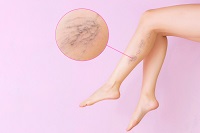
- Ulcers: It helps manage active ulcers and mild forms of atrophy.
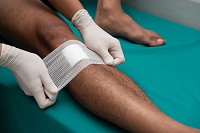
- Swelling: Edema or lymphedema is when there is severe swelling in the body. This can be treated with medical compression socks.
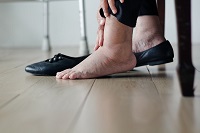
- Blood clot: Blood pooling in the legs can cause blood clots, and they can be managed with these compression socks.

The medical-grade compression gear is mostly used by recommendation from a doctor. There are many types for different parts of the body, and compression is much more effective. You will likely not need them unless you suffer from any vascular issues, so normal off-the-rack compression gear will do just fine in most cases.
Who Can Use Compression Socks

Though there are certain common uses for compression gear (article), there is no real reason you need to have to use it. You can use it simply because it feels good or provides comfort. They are useful to all kinds of people, from businessmen and athletes to stay-at-home moms and people with injuries.
Although, there is one exception to this. If you are someone who has a severe vascular disease, then you should not use compression socks. For everyone else, though, there is a huge range of compression products out there, and you will most likely find what you’re looking for.
Where to Buy Compression Socks
It can be quite confusing to search through hordes of sites to find the specific sock you want. So to help out, here is a great website dedicated to quality compression gear: ProCompression (article).
How Are Calf Sleeves Different?
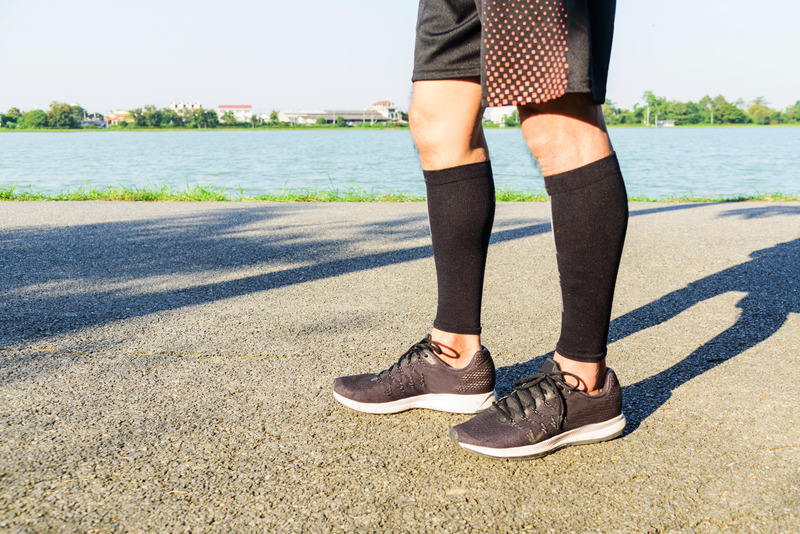
Calf sleeves are very similar to compression socks, but they do serve a different purpose. In fact, choosing a calf sleeve over compression socks could be very harmful. The biggest difference you will note is that sleeves do not cover the foot. They stop at the ankles, while compression socks completely cover the foot.
Calf sleeves are actually better for intense athletes and runners. Just like the compression socks, they provide pressure, but it much more concentrated pressure. Since they do not cover the foot, they can cause blood to pool in your calf. This will cause the swelling and pain you want to get rid of.
Who Can Use Calf Sleeves
It is best not to use calf sleeves if you are not engaging your legs in a lot of activity. This is because the kind of pressure it provides is too concentrated for a sedentary lifestyle. That kind of pressure would instead make blood pool in your feet.
Also, after extended periods of time, they can get really uncomfortable and painful. So listen to your body and do not use a product that does not help.
The Benefits of Calf Sleeves
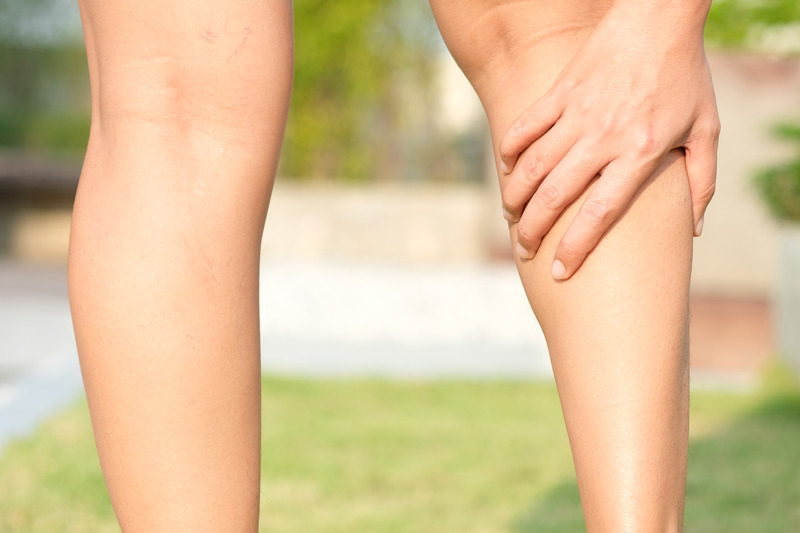
For those people who use calf sleeves, it is really helpful. Not only do they provide the same compression as a compression sock, but they also help with muscle fatigue. When you exert your muscles during exercise, the vibrations cause your muscles to tire. The sleeve supports your muscles to decrease vibrations and reduce fatigue.
Though calf sleeves can seem intimidating now that you know they may cause you harm, you shouldn’t stress about it. As long as you listen to your doctor and use the right products, you will be just fine.
Sizing Your Calf Sleeve
Knowing what size sleeve to buy is important because you want to have a snug fit for the pressure, but you also do not want it so tight that you are restricting blood flow. If you’re not sure what size is best suited for you, check out this handy compression sock sizing chart (article).
Are Compression Socks or Calf Sleeves Better?
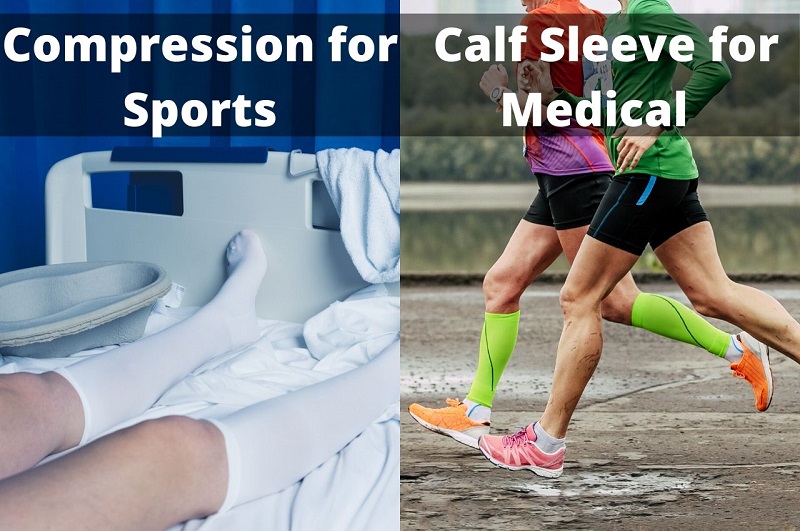
A compression sock would be better for someone who is not very active, or who is using it to recover from an injury. Calf sleeves are better suited to very active people who need preventative support during physical activity.
Where you are, the temperature, the terrain, and the intensity of your workout can also help determine if one is better for you than the other.
Overall, when it comes down to it, you can either choose a compression sock or a calf sleeve depending on your needs. You should evaluate the amount of exercise you do and how much time you spend sitting in a chair. There are different options for either one.
What Can Affect Your Choice of Sock or Sleeve
Weather: The temperature can also affect whether you go for a compression sock or calf sleeve. If it is really hot out, you might want to go for a sleeve. This is because your body can lose a surprising amount of heat through the exposed area above your ankle. If you pair a sleeve with ankle socks, the cooling effect can be rather surprising.
On the other hand, if it is cool out, a sock would be the way to go. That little extra warmth can be really helpful when it comes down to it, so judge your surroundings and pick what’s best.
Area and distance: If you are running long distances through marshy terrain, you might want to change into a dry pair of socks at some point. A sleeve might work better for you, as it would make changing socks easier.
On the other hand, if you are in the city taking a jog around the block, a sock would probably be fine. Think about what’s easiest in the long run.
Performance vs. recovery: If you are wearing them to help with your recovery post-workout, a sock would be better. This is because for relieving soreness and swelling, the gentle pressure of the sock on your foot feels sublime. Both socks and sleeves work just as well to help during exercise, though, so when it comes to that, think about what suits you best.
Your environment can play a big role in what you choose. Some compression may not be as comfortable in the cold or the heat. Whether or not it is a tropical area or smack in the middle of the big city can make a big difference too. Again, know your surroundings and choose based on comfort and what works best for you.
Do Other Kinds of Compression Gear Work?
There are a lot of professional athletes and celebrities who would swear by expensive compression gear. These tight-fitting clothes are thought to hold all your muscles in place and improve oxygen levels while exercising. This was all thought to be true until recently, where a new study (article) proved otherwise.
The men in the study were made to run (article) on a treadmill. First without any compression gear, and then with compression gear. The researchers measure their oxygen levels, body position, stride, and many other factors. The results were that there was no difference in the exercise efficiency in the subjects.
Now, manufacturers have repeatedly claimed that their compression gear improves performance. Their argument is that by improving circulation, the compression gear improves oxygen delivery; therefore, it improves exercise efficiency. But when these claims were put to the test, the results showed no obvious effects.
So, needless to say, it seems that unless the compression gear is prescribed for a specific purpose by a doctor, it may not work as described. The “exercise wear” that is so often used does not, in fact, provide any real benefits.
So, be sure to check whether or not your compression gear actually works, or is just for show.
Does Compression Work Overall?

A lot of you probably believe that compression gear does work for you and that it does improve your performance. This may be a placebo effect.
This is detailed by Abigail Stickford (article), a researcher at the Institute for Exercise and Environmental Medicine in Dallas. She says that because so many people believe that the compression gear works, in a small way, it does.
She also detailed how based on the scientific evidence from the study above, the best use of compression would be for sports such as basketball or tennis, because it was seen that jumping and power performance could be maintained for a much longer time when using compression shorts.
It is important to remember that the most common use of compression gear is to combat gravity. Gravity is pulling your blood down, and the compression is used to circulate it back up.
So, there are no magical effects of compression, just the biological effects it was made for. Do not expect your athletic performance to suddenly be boosted by using compression.
What Compression Does for Injuries
Recently, the number of physical therapy programs developed has skyrocketed. In these programs, one very popular method of recovery is using compression. The way compression works on injuries is that it reduces chronic pain, for the most part.
The compression also helps reduce swelling as you heal and moves the healing process along with improved blood flow. As your blood flow improves, your damaged muscles and tissue are able to get more oxygen and heal faster. The comfort of the pressure can also just provide a nice sensation in tired and sore muscles.
Even if it is not serious, injury-related pain, compression helps. No one can really prevent arthritis as you get older, but there are specific compression socks that are much better for treating and helping manage arthritis.
There are other specialized ones for the different muscle and bone issues that people might have. So, don’t settle on uncomfortable, because the right one for your needs is out there.
Compression for Injury Prevention
It’s always better to prevent injuries than spend months on recovery, so a lot of people, athletes especially, use compression to maintain their bodies.
By making sure your blood flow is never stagnant, you reduce your chances of hurting yourself. By keeping your muscles warm and oxygenated, you reduce your risk of tearing a muscle or ligament.
Conclusion
No matter what your physical need is, there is a compression sock or sleeve out there for you. It is just a matter of consulting with a doctor or your own body to figure out why you need compression.
From there, it is just about finding the most comfortable option for yourself. If you have a serious medical issue, don’t settle for cheap and unhelpful. Consult a doctor and find out what you need.
Even if you just want to take some precautions against future injuries, there is an option for you too. From comfort and prevention to physical therapy and vascular diseases, compression can help.
Remember that there is always something to fit your needs perfectly. And, above all else, take extra care when making these decisions for your health, because it is always better to put in a little extra effort as a preventive method, rather than spend months on recovery from a serious injury.
Thanks for visiting Helpshoe.com
References:
https://procompression.com/blogs/articles/guide-to-compression-socks-and-sleeves
https://procompression.com/blogs/articles/compression-socks-or-calf-sleeves
https://www.brightlifedirect.com/blogs/news/compression-socks-or-sleeves-whats-the-difference
https://www.webmd.com/dvt/choose-compression-stockings#1
https://www.zensah.com/pages/why-wear-leg-compression-sleeves
https://www.mensjournal.com/health-fitness/when-does-compression-wear-actually-work-20150305/
https://comprogear.com/medical-compression-socks/
https://www.lilytrotters.com/blogs/lily-trotters-news/sock-vs-sleeves

